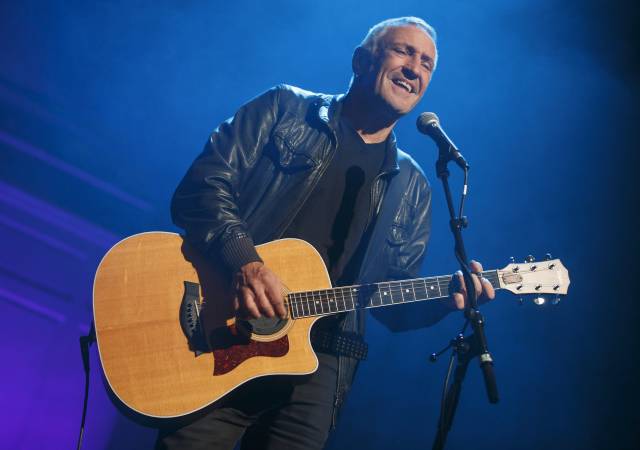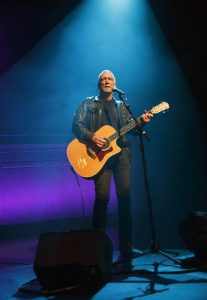
 John R. Waters has been playing John Lennon for more than two decades. In Lennon: Through a Glass Onion he becomes a version of the late singer without relying on makeup or costumes to help him achieve this transformation. Instead, he appears on stage in dark jeans, boots and a leather jacket. He walks towards a microphone to the right of the stage and guitar in hand (with piano accompaniment by Stewart D’Arrietta), proceeds to tell Lennon’s life story in fragments. His mind wanders as he goes from talking about his marriage to Yoko Ono, to how he used Paul McCartney’s “pretty face” as bait to get laid during their youth, to singing about his son Sean, and talking about his personal view on politics. The seeming lack of dramatic structure, making it seem as if we’re listening to anecdotes from a friend at a bar.
John R. Waters has been playing John Lennon for more than two decades. In Lennon: Through a Glass Onion he becomes a version of the late singer without relying on makeup or costumes to help him achieve this transformation. Instead, he appears on stage in dark jeans, boots and a leather jacket. He walks towards a microphone to the right of the stage and guitar in hand (with piano accompaniment by Stewart D’Arrietta), proceeds to tell Lennon’s life story in fragments. His mind wanders as he goes from talking about his marriage to Yoko Ono, to how he used Paul McCartney’s “pretty face” as bait to get laid during their youth, to singing about his son Sean, and talking about his personal view on politics. The seeming lack of dramatic structure, making it seem as if we’re listening to anecdotes from a friend at a bar.
Meditative without being lugubrious, Lennon: Through a Glass Onion is a fascinating essay about the effects of fame, and Waters, gives a memorable performance in which we see him face mortality in a unique way. We had the opportunity to talk to him to discuss the show.
I read somewhere that you came up with the idea for this show as a way to bring together the experience you’d amassed as a musician and as an actor, which made me curious about whether you’d contemplated doing a show about someone else other than Lennon?
Actually when I was thinking of something to do, I knew I wanted to do something musical, and I would have liked to do something original but I didn’t have time for that, I had four weeks to prepare something so pre-existing music was the best choice. I was trying to think of an idea about John Lennon, so no, I didn’t have an alternative idea. He was perfect, I just needed to put the songs together and tell a story.
You don’t look at all like John Lennon, and you don’t sound like him either…
What I try to do is put a figure up there that represents a blank canvas for the audience to put their own John Lennon on. There’s a bit of a mental process there, and I’ve had some people say “it was just like seeing John Lennon!”, so there’s some theatricality involved in playing that illusion.
Right. I figured you might be trying to create this “John Lennon as an everyman” kind of figure which is how some people see him, but also it made me wonder if part of it was to avoid making the show more about the mimicry and less about the experience.
Yes. It can become a bit like a caricature rather than a character onstage, so I did want to avoid all of those pitfalls and I was unafraid to ask my audience to use their imagination and work along with me, which is one of the great things about live performances.
Are there any biographical performances you admire in either screen or stage?
Something that comes to mind is Geoffrey Rush who played Peter Sellers and I thought he did a great job without looking like Sellers. He got the persona rather than the exact details and it doesn’t really matter who the actor is as long as they can make us believe who they are. Robert Downey Jr. for example plays Sherlock Holmes and it was brilliant because it was Holmes-ian in every way, but rather different to anything else we’ve ever seen.
For some reason the two performances that came to mind for me in terms of people not looking like their real life counterpart were Judy Davis as Judy Garland and Cate Blanchett as Katharine Hepburn...
...yes and Bob Dylan! (Laughs) I’m Not There made me feel like I was on safe ground here, back when I started I was not much older than John Lennon was when he died. Even back in 92 there were a lot of examples of playing someone’s essence.
 I find it very interesting that you ended up playing two key figures from 1960s pop culture: Captain von Trapp in an Australian production of The Sound of Music and John Lennon, which at some point where almost complete opposites as to what direction popular music would be taking. In one corner we had the old fashioned Broadway musical and then we have the shaggy-haired rock and roll artists...
I find it very interesting that you ended up playing two key figures from 1960s pop culture: Captain von Trapp in an Australian production of The Sound of Music and John Lennon, which at some point where almost complete opposites as to what direction popular music would be taking. In one corner we had the old fashioned Broadway musical and then we have the shaggy-haired rock and roll artists...
It’s a weird thing because I started as a rock musician, but I was in Hair and met people in the theater world who suggested I should try being an actor. So I decided to audition for these Broadway shows and I’d never done anything like this before. I played a part in a rock musical version of Two Gentlemen of Verona in the 1970s, so I found myself doing more Broadway style musicals and I don’t have a musical theater voice, I have a rock voice, but I use my voice to sing what I’m asked. So when I did “Edelweiss”, it sounded like Joe Cocker was doing it. I guess if you can get the song across, you’re OK.
The entire show is pretty much set in the moments in between when Mark Chapman first fires the gun and the time when John Lennon died. Playing someone who dies onstage every night, sounds grueling. Is it?
It does have an effect, there are some heavy thoughts behind this and I do get very involved in the show every time I do it. I don’t want to exaggerate and say it’s a depressing show, but I’m actually celebrating his life and I ask the audience to celebrate with me. I’m depicting a very tragic occurrence, but I think I’m doing it for uplifting reasons. I think the world needs statements about peace and the idea of peace and how it only comes from within, not politics.
You don’t use the songs chronologically, so it makes for an impressionist biographical account. How did you decide to do this?
A: If there was a story I wanted it to emerge like a collage, so that bits and pieces make sense together. Like he said in his "Abecedarium", “this is my story both humble and true. Take it to pieces and mend it with glue”.
Have you found that the meaning of his songs has changed for you throughout the years?
I’ve learned a lot about what the songs do to you and his songwriting is so good that it achieves great power. The song “How?” which a lot of people don’t know because it was in the album Imagine and was overshadowed by the title song, which is understandable, but “How?” is a beautiful song about the loneliness of the human condition and I really experience that song every night.
Many people feel like they knew John Lennon. Do audience members come up to you after the show to talk about what Lennon meant to them?
I’ve had some people be very emotional and this is something I never thought would happen. I thought they’d be entertained by the show and maybe get a warm feeling, but some people who were attached to him and didn’t even realize it have found it emotional. For example somebody in London came up to me after the show on the verge of tears and said “I didn’t realize what a strongly politically committed person John Lennon was and how deeply personal his politics were, they weren’t about power or nations, but the politics of humanity”, and that is the most powerful statement anyone has ever made to me about the show.
How does your performance change according to audience reactions?
A: There are times when I play a slightly lighter, cheekier kinda figure, sometimes I’m more aggressive and all these little variations were part of John Lennon as I perceive him and they’re part of me too. I want it to be John Lennon filtered by John Waters. My idea was always to be very low key.
You said that John Lennon though that “Rock Lobster” by The B-52’s was the future of music, so I want to know what John Waters thinks of as the future of music?
To me it’s anything that’s played with instruments, you use electronics to augment and enhance recordings, not as an instrument, so current pop music leaves me rather cold and I don’t think anybody likes it too much. A rock and roll band to me is guitars, bass, drums, keyboard, singer...that’s everything you need and there are bands around that do that. I think that the future of music is always gonna be that at its core and everything else becomes an embellishment. Current pop music is very female dominated with singers doing dance music, and lyrically it just seems they’re getting up onstage and saying “fuck me, fuck me, fuck me!” which doesn’t really do much for me. I love sex but this does nothing for me. That kind of stuff isn’t the future.
Please satiate my curiosity. You also share a name with one of the greatest American filmmakers. Are you a fan?
He’s one of my favorites! I think Pink Flamingos and Hairspray are his best. I love his use of extreme exaggeration to get across some really good points. Hairspray is one of the best anti-racism movies I’ve ever seen.
Maybe we’ll see you playing Edna in the musical some day!
(Laughs) You know, I haven’t done drag yet, but I’m ready for anything!
Lennon: Through a Glass Onion is now playing at Union Square Theatre. For tickets and more visit the official website.